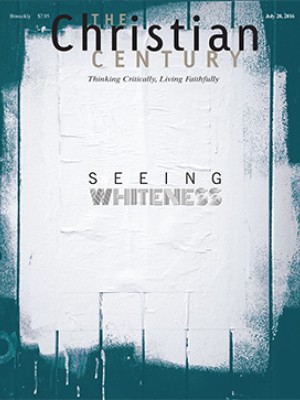August 7, 19th Sunday in Ordinary Time: Hebrews 11:1-3, 8-16; Genesis 15:1-6; Luke 12:32-40
Faith may be the assurance of things hoped for, the conviction of things not seen. But hope, then, is the content of faith.
Hope is the girl you kissed at 17, before electrical current lost its salience, before you knew how far you could take this, before you knew you were gay or perhaps exactly because you did. Hope is the fear mingled with thrill at taking your place among the adults. She writes you three letters before she even leaves town. You would gladly give up everything for her. Your treasure is in heaven and heaven is in her.
Hope is another spring. The fullness of creation’s generosity pushes out on the ash tree leaves that shudder in the warm sun. Hope is the worms that digest the soil, over eons breaking mountains down into hills and hills into plains. The haze rises. The world shimmers and awaits the first thunderstorm of summer. Hope is the lake seen from the top of the hill.
Read our latest issue or browse back issues.
Hope is the neonatal intensive care unit where 26 ounces of nephew reside—wired, tubed, warmed, aching for touch. It takes three minutes of dedicated scrubbing just to get yourself in the door. He will live, leading a life as complex and open-ended as any, filled with karate and Star Wars and jumping off the stairs. But the worried look of his mother will never leave your memory: her reluctance to leave his side, the way she reaches for him slowly, carefully, in the crib. She offers to let you hold him, but you can see all she wants is to take him home, out of this place with its urgent bells and mechanical wheezes, the nurses who vacillate between warmth and alarm.
Hope is the adopted son, the grafted inheritor, prone to wandering on his single-speed bike—he of three homes before his forever family, then three more again. Which place is he from? Will he fly from here when he is of age? Will he drift from job to job in the desert of America? He already speaks of wanting a warmer place than his home in Wisconsin. (Did Abraham ever write to Terah when he left Haran?)
If there are to be, as with Abraham’s descendants, innumerable stars and grains of sands, it will be through this boy. His parents aren’t 99 and 75, but things drift that way. His father has taken to cultivating a beard, anointed with balm and oil, carefully brushed out twice a day. He avoids looking at the top of his head. This too is a form of hope.
Hope is the ducks who waddle into the backyard, wanting a safe place to brood. Hope is the rabbits who share space under the fir, ignored by the leashed dog, their hearts wanting nothing more than a blade of grass or a tulip petal. They run at the slightest sound, the gentlest motion. It is the most human thing they do; on some level, we are all afraid of cats.
Hope is Ariel liberated, Caliban comforted by music, the book of spells buried deep in the Sargasso Sea, Prospero asking pardon from the audience now that he has no charms to lean on. Hope is Prince at the Kingdom Hall in Minnesota (Brother Nelson, they called him).
Hope is Frost’s dimpled spider, fat and white, waiting for a moth in the night. Wise bridesmaids are not the only ones who prepare. There is a terrible design to God’s plans, a burdening knowledge for those who see what must come at last, an unsettling trust that a better country awaits. Hope is God’s shamelessness.
Hope awakens, has a smoke, and wonders why—why now, when the great-grandchildren are just starting to get big. She went down hard, fought to the very end. She died on a warm day in the spring. Hope is the little sister who twirls on the cemetery grass, the big sister who leaves a sprig of lilac on the tombstone, the seeds that germinate above the cement vault.
Hope is the horizon. The Lord loves those who wander, loves the lost, loves apostles broken down by the side of the road. God spreads his seed far and wide, hoping that some will come back to him someday. The disciples pray to be the chaff and burn rather than expose themselves to the Messiah’s demands. Hope is the buckle on the belt of the master who serves, the servants looking hesitantly for his permission to eat.
Hope is the refugee camp, the world of tents and temporary housing, the tears in the sea of Lesvos. The children play soccer; the life preservers are a mountain unto themselves. Germany seems like a distant dream.
To hope is to dream and to give up on dreaming, to confide and to give up confidence. It is a nuisance, the knock that comes in the middle of the night. Hope is the meat of life.






